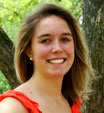When Emily Cartwright ’11, of Randolph, Mass., arrived at Holy Cross, she had no intention of pursuing a science major. You might even say she avoided science like it was the plague.
Now a standout scientist and researcher, Cartwright heads to Emory University in Atlanta this summer to study infectious diseases. And she attributes her passion for science to a biology class she took her first semester on The Hill — one she enrolled in to get her natural science requirement “out of the way,” as she puts it.
But, unexpectedly, in Molecular Biology of the HIV Pandemic with Assistant Professor Ann Sheehy, “I absolutely fell in love with science and biology,” recalls Cartwright.
As a result of the course, not only did Cartwright declare a biology major and biochemistry concentration, but she also decided to pursue research on HIV — a path that has brought her great success and opened doors for her future.
Through the College’s summer research program, Cartwright spent two summers conducting research on campus alongside Sheehy. An influential role model and mentor to the promising young scientist, Sheehy extended Cartwright’s summer position through the academic year.
Cartwright studied the interaction between A3G, an anti-HIV human protein found in immune cells, and Vif, a viral protein found in HIV that counteracts A3G. And her research paid off: She discovered a mutant form of A3G that can suppress HIV to approximately 10 percent. She and Sheehy are preparing these exciting findings for possible publication.
“Emily has been one of the best students I have been lucky enough to recruit to the lab,” says Sheehy, “and I expect she will continue to impress as she moves on to graduate school. She has always been willing to push herself and her work, to ask difficult questions and not shy away from the inevitable workload that follows from this insatiable academic curiosity.”
Cartwright’s research inspired her decision to attend graduate school, where she feels she will be well prepared. She enters the immunology and molecular pathogenesis Ph.D. program at Emory in August.
“It’s amazing to have had the opportunities I had as an undergraduate at Holy Cross,” she explains. “Even graduate students work with a post doc; I was able to work directly under my professor. That close relationship helped me to develop as a scientist much quicker than those who didn’t have that type of access.”
Last fall, Cartwright was one of only 14 undergraduates nationwide to attend an AIDS vaccine conference at Emory. She was also the recipient of a Young Investigator Award that enabled her to attend the prestigious Conference on Retroviruses and Opportunistic Infections, featuring the world’s leading HIV/AIDS researchers. There, she was part of a team (with Sheehy) that presented a research poster.
But the collegiate experience that stands out the most for Cartwright was when she met and interviewed Anthony S. Fauci, M.D. ’62, director of the National Institute of Allergy and Infectious Diseases and leading HIV/AIDS scientist, during his 2010 visit to campus.
Like Fauci, Cartwright recognizes the benefits that her liberal arts education will have on her science career. And she believes that having studied the humanities along with the sciences will make her a better researcher.
“My Holy Cross education gave me a wide lens with which to view my profession,” she says. “In class and in the lab, I’m able to approach things from a different perspective and solve problems in ways that others with only a science background wouldn’t necessarily be able to.”
Related Information:
Cartwright '11: First-Year Course Requirement Sparked My Passion for Research
Biology major heads to top-flight Ph.D. program
Read Time
3 Minutes
